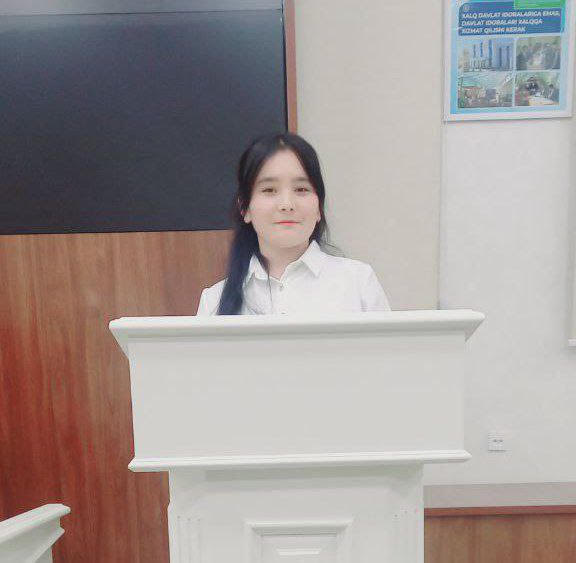Abduvaitova Shahribonu. Born in Muzrabot District, Surkhandarya Region. 2nd-year student of the Faculty of Foreign Philology of ÒZMU. Coordinator of Intellectual Studies at the Faculty of Foreign Philology of ÒZMU. Member of the People’s Democratic Party and “Kelajak” Free Volunteer Movement. Author of many articles and articles published in republican and international newspapers. done

Theoretical issues of Uzbek linguistics and linguistics
Annotation: This article talks about the stages of development of Uzbek linguistics, as well as the researches of our scientists about the problems that have not been solved, the formation of the language, its socio-economic and biological value, modern aspects of linguistics.
Abstract: This article talks about the stages of development of Uzbek linguistics, as well as the researches of our scientists about the unresolved problems, the formation of the language, its socio-economic and biological value, modern directions of linguistics
Keywords: Uzbek literary language, etymology, theory of linguistics, general linguistics, linguistics.
Keywords: Uzbek literary language, etymology, theory of linguistics, general linguistics, linguistics.
National development is clearly visible in the rise of the position and prestige of the national language. Today’s new stage of Uzbekistan’s development – based on the requirements of the period of national rise, extensive work is being carried out to increase the place and prestige of our mother tongue in society. The wide-ranging reforms of our country have also made the status of the Uzbek language the state language. The legal decisions adopted to strengthen and raise its status led to a new stage of scientific and research work in the field of linguistics. In today’s globalization era, every nation, every independent nation, must protect its national interests, first of all, preserve its culture, age-old values, and mother tongue. It is natural that priority should be given to the issue of preservation and development. In this sense, researching the linguistic heritage of the beginning of the 20th century, which remains in history as the first page of the formation and development of Uzbek linguistics at the level of a modern science, is of great importance in the work of securing our national interests and restoring our spiritual values. Uzbek linguistics as a modern science formed in full quality. All the work done on learning the Uzbek language was focused on one main goal – to define the laws of the development of the current Uzbek language and the standards for all branches based on this, because the language is the basis that determines our spirituality. If we look back at the years of independence, some works related to the study of the scientific works of scientists who contributed to Uzbek linguistics have been done. began to be seriously studied from the 30s of the century. It was during this period that Russian scientists A.N. Kononov, S.E.Malov, K.K.Yudakhin, E.D.Polivanov, A.K.Borovkov, V.Reshetov, along with the scientist A.Gulomov, who created his own school in Uzbek linguistics, talented linguists F. .Abdullaev, T. Ibrohimov, A. Ibrohimov, S. Usmonov, F. Kamolov, T. Salimov, U. Tursunov, E. Fozilov were among them. In order to create a system of grammatical construction of the Uzbek language, the scientist defined the method of world linguistic analysis and classification as the main criterion and created his views by means of the synchro-formal classification method. If we pay close attention to the scientist’s work, we can be sure that he is one of the real founders of both systematic structure and substantial linguistics in the development of Uzbek scientific linguistics. Despite the fact that the synchronous-formal classification method was the leader in Uzbek linguistics until the 40s-80s of the 20th century, from the 70s Sh. .Ubaeva, A.Khojiev, M.Mirtojiev, I.Kochkortoev and others followed in the works of leading scientists. Our scientists are working day and night on unsolved problems in Uzbek linguistics.gives At the same time, it analyzes the issues related to the modern directions that are forming within the field, their object, subject, purpose, tasks, social and educational significance. “Theory of Linguistics” is a relatively complex, scientific, philosophical science. The theory of linguistics is language and society, language and history, language and thinking, language and spirituality, language and cultural development, language levels, language units, language and speech, the formation, development, types of writing, the semiotic nature of language, as a system and structure. discusses the essence, substance and form in language, paradigmatics and syntagmatics, types of linguistic structure. “Theory of Linguistics” gives general, systematic conclusions about the construction of language, the nature of language, the role of language in the social lifestyle of mankind, language and methods of language research. Introduces students to the main trends in linguistics, schools, their specific teachings, activities and views of famous linguists, description of principles related to them, research methodology, methods, important achievements. The science of “Theory of Linguistics” discusses the levels of language. Phonetic-phonological, lexical and grammatical levels are analyzed as the main levels of the language. The essence of the theoretical issues of linguistics is explained through sections such as dialectology, phraseology, stylistics, and etymology. Diachronic and synchronic methods of analysis are used in the study of these issues.
In conclusion, we must say that Uzbek linguistics and theoretical issues of linguistics include a number of important aspects, and also the uniqueness of this language is an important element of expressing national culture. is one of the tasks
References:
1.https://cyberleninka.ru/article/n/ozbek-ilmiy-tilshunosligi-holati/viewer
2. Development of the Uzbek language (Ahmadaliyeva Fazilathon)
3. UZBEK LINGUISTICS AND ITS DEVELOPMENT WAYS (Rakhmatullayev son of Anaskhan Hamidullo)
4. https://tsuull.uz/sites/default/files/tilshunosliknazariyasinashr2020_0.pdf